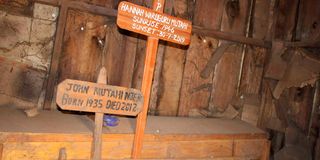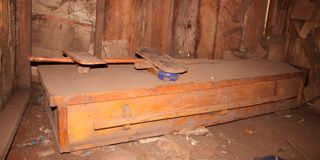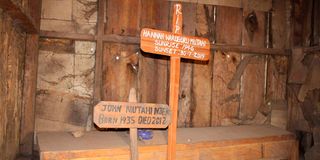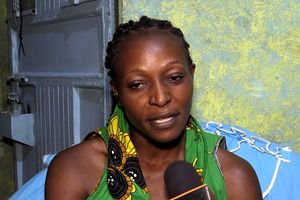
A coffin and two crosses bearing the names of Hannah Waruguru and John Mutahi are kept in the house of Ms Susan Wairimu in Kageraini Village, Nyandarua County. Ms Wairimu has kept the coffin in her house for 13 years. These photos were taken on May 29, 2025.
An empty coffin, two crosses, and a flourishing banana tree now stand where a grave should be.
For 53-year-old Susan Wairimu of Kageraini Village in Nyandarua County, this grim scene is a symbol of unresolved grief.
For 13 years, she has lived with the constant reminder of death—unable to bury either of her parents due to a protracted family land dispute.
The dust-covered coffin belongs to her father, John Mutahi, who died in 2012.
One of the crosses marks his grave—whose exact location she still doesn't know.

A coffin and two crosses bearing the names of Hannah Waruguru and John Mutahi are kept in the house of Ms Susan Wairimu in Kageraini Village, Nyandarua County. Ms Wairimu has kept the coffin in her house for 13 years. These photos were taken on May 29, 2025.
The other cross was meant for her mother, Hannah Waruguru Mutahi, whose body lies unburied at Nyayo Ward Hospital Mortuary in Engineer Town, Kinangop Constituency, since 2019.
Today, Wairimu lives with the coffin and the pain of two interrupted burials.
"We were born and raised on this land. We grew up here with our cousins, playing together, going to school together, and listening to our grandfather's stories in the evening. Why disown us years after his death?" Ms Wairimu says.,
When Mutahi died in 2012, all preparations for his burial had been finalised.
The family was set to bury him on their three-acre ancestral land, where his father, Nathanael Weru, had settled in 1965 after working for a colonial settler.
Weru had instructed before his death in 1991 that his disabled son, John Mutahi, should inherit and be buried on that land.
But on the burial day, Mutahi’s body vanished from Naivasha Level Four Hospital Mortuary.
“All funeral arrangements were in place. We still don’t understand how morgue attendants released his body without a burial permit,” said Wairimu.
The family believes a close relative secretly collected the body and buried it elsewhere.
In protest and grief, the family returned home with an empty coffin, which has remained in their house ever since.
“We are still trying to locate his burial site to fulfil our grandfather’s wishes. Otherwise, a curse will befall us,” said Wairimu.
In July 2019, tragedy struck again.
Wairimu’s mother died at home after years of illness.
Her body was taken to the mortuary in Engineer Town.
On the burial day, another attempt was made to steal the body.
This time, however, mortuary attendants, sensing something was amiss, contacted Wairimu.
Wairimu instructed the morgue not to release the body until she arrived with other mourners and clergy.
But when they reached the mortuary, her uncle presented a court order stopping the burial.
Since then, her mother’s body has remained in the mortuary—six years and counting.
The mortuary bill has ballooned to Sh1.3 million.
“We took the cross with us, but the coffin remained at the morgue,” she said, her voice breaking.

A coffin and two crosses bearing the names of Hannah Waruguru and John Mutahi are kept in the house of Ms Susan Wairimu in Kageraini Village, Nyandarua County. Ms Wairimu has kept the coffin in her house for 13 years. These photos were taken on May 29, 2025.
For two years, the open grave that had been dug for her mother remained untouched. In 2021, local elders advised her to plant a banana tree in the pit.
“Leaving the grave open for that long was believed to bring bad luck,” said village elder Samuel Kahato.
“It was also distressing to the family and neighbours.”
He added, “This family has lived here all their lives. Their grandfather is buried here. We never imagined they would be denied the right to bury their parents. These are orphans crying for justice.”
Throughout the years, Wairimu has made countless trips to the Milimani Law Courts, seeking to reclaim burial rights.
The court case over land ownership—filed after her uncle's objection—was never heard before his death last year, further complicating the matter.
“I have been mourning all these years. It is tormenting to live with the coffin and crosses in the house. It affects my children deeply,” she said.
According to Nyakio Location Chief Isaac Kiarie Mbugua, burial permits had been properly issued.
“Normally, when a person dies at home, the area chief issues a burial permit. The same must be produced at the mortuary along with the national ID before a body is released. Only those listed in the permit can collect it,” he said.
But for the Mutahi family, the paperwork was not enough to stop the disruption of a sacred rite.
Pastor Joseph Temo of Faith Ministries International, who has been supporting the family spiritually, said the prolonged mourning has taken a psychological toll.
“Waking up every morning to see a coffin and two crosses in your house, while your mother’s body lies unburied in a morgue, is emotionally devastating. This isn’t just grief; it’s trauma,” he said.
He explained that the coffin cannot simply be removed from the house without traditional cleansing. “There must be a sacrifice. This is not a normal mourning period—it’s a land dispute that has inflicted deep spiritual and emotional wounds.”
Wairimu’s plight went viral on social media after it was highlighted by comedian and activist Eric Omondi. Through a fundraising campaign, she has raised Sh500,000 of the Sh750,000 needed to buy a nearby plot where she hopes to bury her mother.
“I want to lay my mother to rest near our home,” she said. “I’m grateful to everyone who has supported us after Eric Omondi brought attention to our situation. But we still have a long way to go. We need to settle the mortuary bill and handle burial logistics.”
For now, the empty coffin remains in her house. The banana tree continues to grow.
And Susan Wairimu waits—still hoping, still grieving, and still seeking justice.






